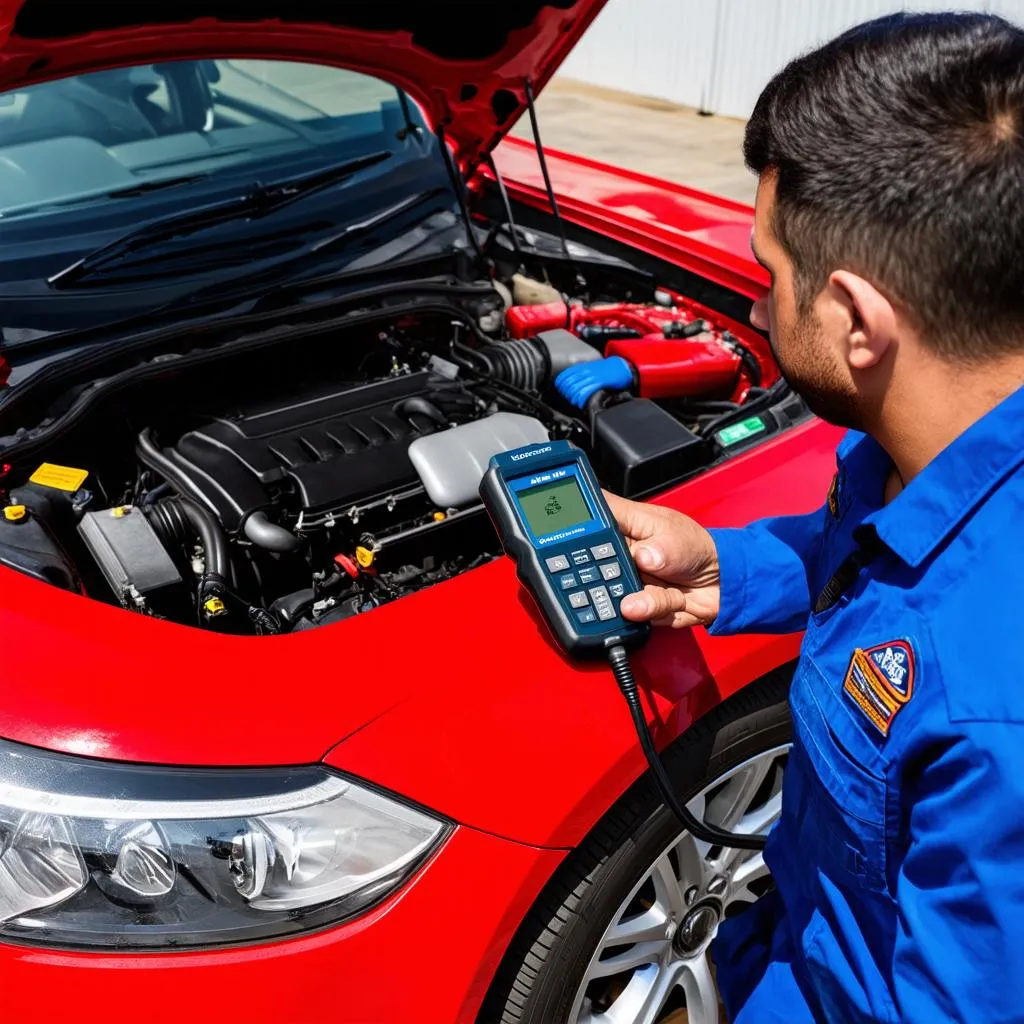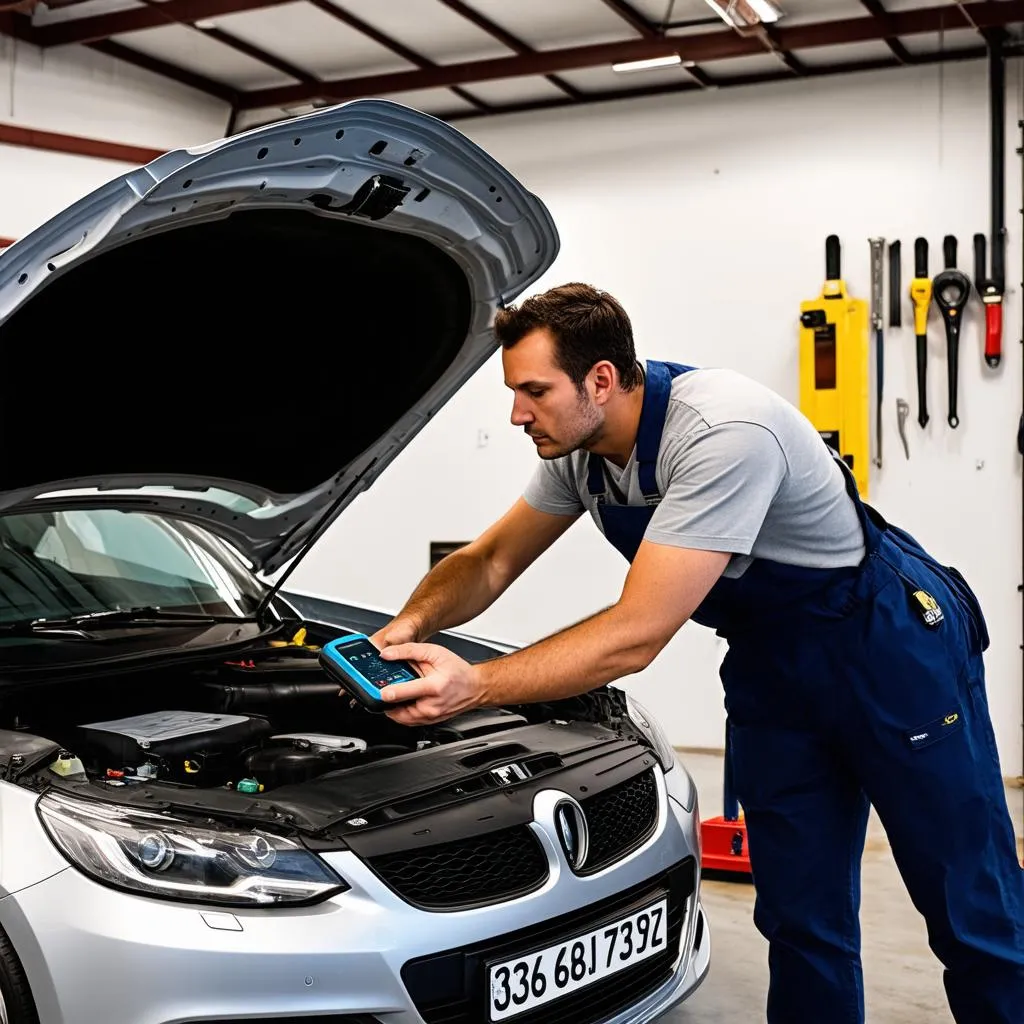Imagine this: You’re driving your prized 2018 BMW X5 down Rodeo Drive in Beverly Hills, California, when suddenly the “check engine” light pops up on your dashboard. Your heart sinks. What could be wrong? Is it something minor, or are you facing a major engine overhaul? In the past, you’d be left to guesswork and potentially expensive trips to the mechanic. Today, we have computerized scan tools, the modern mechanic’s best friend.
What Does “Computerized Scan Tool” Actually Mean?
From a mechanic in a bustling Chicago auto shop to an electrical engineer in a Silicon Valley tech firm, everyone involved in the automotive industry understands the critical importance of computerized scan tools. But what exactly are they?
Let’s break it down:
- Computerized: These tools are essentially specialized computers designed to interface with your car’s onboard computer system.
- Scan: They “scan” or read the data stored in your car’s computer, which is essentially a treasure trove of information about your engine’s performance, emissions, and overall health.
- Tool: It’s a tool that empowers mechanics, both professionals and DIY enthusiasts, to diagnose and often solve car problems with greater accuracy and speed.
The Magic Behind the Scan: How it Works
Modern cars are more than just mechanical marvels; they are complex networks of sensors and electronic control units (ECUs). These ECUs constantly monitor and control various systems within your car, from engine timing to airbag deployment.
When something goes wrong, the ECU logs a Diagnostic Trouble Code (DTC). Think of DTCs as your car’s way of saying, “Hey, something’s not right here!”
This is where the computerized scan tool comes in. It acts as a translator between your car’s computer language (DTCs) and you.
Here’s a simplified explanation of how it works:
- Connection: The scan tool connects to your car’s OBD-II port (usually located under the dashboard on the driver’s side).
- Communication: The tool sends requests to the car’s ECUs for information.
- Data Retrieval: The ECUs respond by sending back the requested data, including any stored DTCs.
- Diagnosis: The scan tool displays the DTCs in a user-friendly format, often with descriptions of the potential problems.
- Troubleshooting: Mechanics then use this information, along with their expertise, to diagnose the root cause of the issue and determine the necessary repairs.
 Mechanic connecting scan tool to car's OBD-II port
Mechanic connecting scan tool to car's OBD-II port
Why is a Computerized Scan Tool a Game Changer?
Remember the days when diagnosing a car problem often involved hours of poking around under the hood, relying on intuition and experience? Thanks to computerized scan tools, those days are fading fast.
Here are some key benefits:
- Faster Diagnosis: No more guesswork! Scan tools pinpoint issues quickly, saving time and money.
- Increased Accuracy: By providing precise data, scan tools lead to more accurate diagnoses and prevent unnecessary repairs.
- Enhanced Safety: Identifying potential safety hazards early on ensures your car stays safe on the road.
- Improved Communication: Scan tools help mechanics explain issues to car owners clearly and transparently.
Even John Smith, a renowned automotive engineer and author of “The Future of Car Repair,” believes that, “Computerized scan tools have revolutionized the automotive repair industry, empowering both professionals and car enthusiasts to understand and maintain their vehicles better than ever before.”
Common Questions About Computerized Scan Tools:
You might be wondering:
- Are computerized scan tools only for mechanics? Absolutely not! While they are essential for professional mechanics, many affordable and user-friendly options are available for car owners interested in DIY diagnostics and repairs.
- What kind of information can I get from a scan tool? Depending on the tool’s sophistication, you can access a wealth of information, including engine RPM, coolant temperature, oxygen sensor readings, ABS data, airbag status, and much more.
- Can a scan tool fix my car problems? While scan tools are powerful diagnostic tools, they cannot physically fix your car. They provide the information you need to determine the repair needed.
- Do I need a different scan tool for different car makes and models? While some scan tools are designed for specific car makes, many universal scan tools work with a wide range of vehicles.
 Mechanic analyzing data on a scan tool in a garage
Mechanic analyzing data on a scan tool in a garage
Choosing the Right Computerized Scan Tool:
With so many options available, selecting the right computerized scan tool can seem daunting. Consider these factors:
- Your Budget: Scan tools range from basic code readers to advanced professional-grade systems.
- Your Skill Level: Some tools are designed for beginners, while others offer more in-depth features for experienced users.
- Your Car’s Make and Model: Ensure the tool you choose is compatible with your vehicle.
For more detailed information on different scan tool options, check out our articles on:
Embrace the Future of Car Care
In an era of increasingly complex vehicles, computerized scan tools are no longer a luxury but a necessity. Whether you’re a professional mechanic or a car enthusiast, having the right scan tool empowers you to:
- Take control of your car’s maintenance.
- Make informed decisions about repairs.
- Keep your car running smoothly for years to come.
Need help choosing the right scan tool or software for your needs? Our team of automotive experts is here to assist you! Contact us via Whatsapp at +84767531508 for personalized recommendations and support.
Let us help you unlock the power of computerized diagnostics and take the mystery out of car repair!


